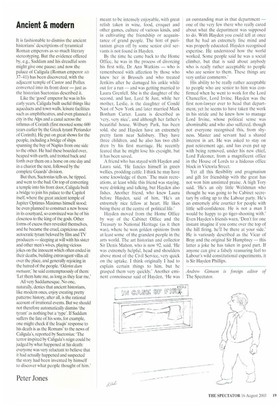Ancient & modern
It is fashionable to dismiss the ancient historians' descriptions of tyrannical Roman emperors as so much literary stereotyping. But the evidence offered by. e.g., Saddam and his dreadful sons might give one pause; and now the palace of Caligula (Roman emperor AD 37-41) has been discovered, with the adjacent temple of Castor and Pollux converted into its front door — just as the historian Suetonius described it.
Like the 'good' emperor he was in his early years, Caligula built useful things like aqueducts and town walls, leisure facilities such as amphitheatres, and even planned a city in the Alps and a canal across the isthmus of Corinth (first mooted some 600 years earlier by the Greek tyrant Periander of Corinth). He put on great shows for the people, including a bridge of ships spanning the bay of Naples from one side to the other. He had these boarded over, heaped with earth, and trotted back and forth over them on a horse on one day and in a chariot the next, followed by the complete Guards' division.
But then, Suetonius tells us, he tipped, and went to the bad. On top of converting a temple into his front door, Caligula built a bridge to join his palace to the Capitol itself, where the great ancient temple of Jupiter Optimus Maximus himself stood; he even planned to construct a new house in its courtyard, so convinced was he of his closeness to the king of the gods. Other forms of excess then revealed themselves, and he became the cruel, capricious and autocratic tyrant beloved by film and TV producers — sleeping at will with his sister and other men's wives, playing vicious jokes on the innocent which often ended in their deaths, building extravagant villas all over the place, and generally rejoicing in the hatred of the people. `Oderint dum metuant: he said contemptuously of them: 'Let them hate me, as long as they fear me.'
All very Saddamesque. No one, naturally, denies that ancient historians, like modern ones, enjoy creating pretty patterns: history, after all, is the rational account of irrational events. But we should not therefore automatically dismiss 'the tyrant' as nothing but a 'type'. If Saddam suffers the fate of his sons, for example, one might check if the Iraqis' response to his death is as the Romans' to the news of Caligula's, reported by Suetonius: 'The terror inspired by Caligula's reign could be judged by what happened at his death: everyone was very reluctant to believe that it had actually happened and suspected the story had been invented by himself to discover what people thought of him.'










































































 Previous page
Previous page